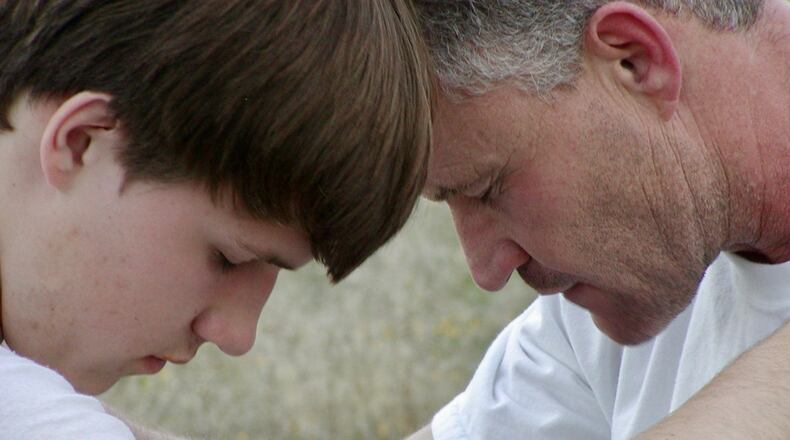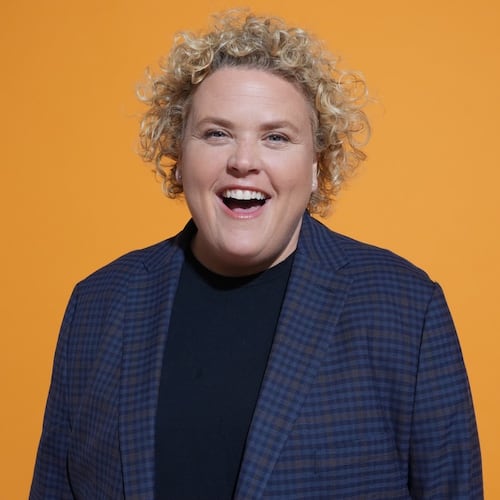Talking with filmmaker Steph Ouaknine earlier this week about her documentary “Queering the Script,” a sharp, funny and insightful look at the burgeoning power of lesbian fans on the entertainment industry, the conversation turned to the current cultural moment and gay visibility.
Being out, being seen, being counted en masse, then harnessing that energy to affect change, can be incredibly empowering to LGBTQ people. But as power accrues and visibility becomes ubiquity, push back is inevitable.
“Culture connects to policy; in tangible ways, it affects your life,” Ouaknine said, paraphrasing one of the Hollywood executives in the film. “But there’s still this backlash, like ‘Why do they have to be queer? Why do they have to have everything now?’”
Those questions run through both “Queering the Script,” and “For They Know Not What They Do,” two standout documentaries in the 32nd annual Out On Film festival, which kicks off today at the Midtown Art Cinema. The answers play out in details that are at turns amusing, heartbreaking and hopeful.
MORE ON AJC.COM: A marriage forged in joy, in spite of dissent
The 11-day festival showcases 126 films, a lineup of drama, comedy, musical, horror, short and foreign cinema, this is inclusive in racial and gender identities. That’s by conscious design given the diversity of the Atlanta audience, said festival director Jim Farmer.
“When I came on board, I knew Out On Film would not just be a naked-boy festival about white men,” Farmer said. “I had no interest in that. I want and need for our festival to reflect who we are as a community and a Southern one as well.”
While favorites from this year’s Cannes, Sundance and Tribeca festivals, including “Portrait of a Lady on Fire,” “Before You Know It,” and “Gay Chorus/Deep South” are featured, Ouaknine’s film, directed by Gabrielle Zilkha and Daniel Karslake’s “For They Know Not What They Do,” resonate in profound ways.
Fan-girls
“Queering the Script,” looks at the fan-girl phenomenon beginning in the mid-1990s when two pivotal events collided; the creation of message boards on the nascent, dial-up internet and the series “Xena: Warrior Princess.” At the time, there were almost no regular lesbian characters in starring roles on television, and certainly not portrayed in romances. Enter Xena, whose relationship with her partner in adventure—if not partner in life—Gabrielle, was widely viewed as same-sex.
The series creators and star, Lucy Lawless (who makes an appearance in the documentary), never characterized it as such while the show was on-air. Fans saw otherwise. The show’s hold has remained steady, so much so, the filmmakers pay a visit to a recent “Xenite” retreat in California for die-hard fans. It’s part Renaissance festival, part “Xena” binge-fest of classic episodes, but it is largely a place where people can be out, deeply nerdy and not judged for being so.
Apart from Xena, the film tracks the development of lesbian characters from “Buffy the Vampire Slayer,” to the “The L Word,” to the reboot of “One Day at a Time.” As those characters gained ground on the screen, the internet grew, social media was born, and a new generation of fans harnessed both to demand fair portrayals of the LGBT community. In interviews with fans, cast members and academics, we see how the swell of voices, amplified by Twitter and Instagram, saved characters and, sometimes, chastened Hollywood executives. This is best illustrated in sequence describing the violent purge of 62, queer, female characters between 2015 and 2017, and how fans rose up beginning with the death of fan favorite, “Lexa,” in the series, “The 100.”
Because most characters on scripted television are not gay, straight audiences might not feel the same depth of loss an LGBTQ person does when one of the few gay characters is killed off, Chandler Meyer, founder of LGBTQ Fans Deserve Better, says in the film.
“For a lot of people, it almost creates a grieving process, like you’re losing a part of your identity that you felt safe in and felt comfortable in,” Meyer says.
Progress and Backlash
Karslake’s film examines identity through another powerful social force: religion. The American director was living in Germany with his husband after the U.S. Supreme Court ruled same-sex marriage legal in 2015. Twelve years earlier, he’d made another documentary, “For the Bible Tells Me So,” about the rise in hate crimes against LGBT people. He had not planned to do another gay-themed film, but in the aftermath of the Supreme Court ruling a raft of events, from the so-called “bathroom bill” in North Carolina to the mass shooting at the Pulse nightclub in Orlando, captured Karslake’s attention.
“Progress has been incredible for the LGBT community in the last 15 years, but with marriage equality, there has been a tremendous backlash,” Karslake said. “For the religious right, it was the last straw.”
MORE ON AJC.COM: Gay Atlanta couple fights to have daughter recognized as U.S. citizen
That is where Karslake situated his latest film. It’s a coming-out story, but not in the traditional sense. This film follows what happens to four sets of straight, evangelical parents when one of their children comes out as gay, lesbian or transgender. The premise isn’t new, yet Karslake extracts a level of poignancy and crushing honesty from the parents and children that makes the film feel fresh and urgent. At a time when the current presidential administration has restricted transgender people from serving in the military and 41 states, including Georgia, still allow “conversion therapy”— a discredited practice that claims to make gay people straight—Karslake’s film argues the backlash to gay progress should have been foreseen. And, he suggests, the loss of life that has followed was inevitable.
Even as he looks at the fallout, Karslake doesn’t shy away from examining stereotypes and challenging them. We meet Vico Baez Febo, whose parents reared him in Puerto Rico, in a close-knit, religious family. The pervasive narrative is that Latino (and African-American families) can show less acceptance of homosexuality than than non-Latino, white families. Even Vico says he worried that his macho father would reject him when he came out. Instead, his father and mother embraced him. That bond of unconditional love would prove a lifeline for Vico when he was faced with an unfathomable horror.
We also meet Linda and Rob Robertson of Washington state and their four children. Both parents grew up evangelical and reared their two sons and two daughters in the church. Then, as a teenager, their oldest son, Ryan, realized he was gay. That began an anguished journey through conversion therapy for Ryan, who’d internalized his church’s teachings and saw his being gay as an abomination. His mother tearfully recounts asking God to please make her son straight. The family waits for a divine answer. Their situation deteriorates.
“Whether you see God as a rabbi, a myth or the Son of God, this movie is about stopping this notion of wanting a child to change because of the way God made them,” Karslake said.
All of the parents in the film are now advocates, if not for the entire LGBT community, certainly for their children. They also haven’t abandoned their faith. They say there is more work ahead.
“We are not done and if we relax too much…we have to be clear there are forces out there that would stop our progress,” Karslake said.
MORE INFORMATION
32nd annual “Out On Film” festival
Sept. 26-Oct. 6
Opening Night Feature: “For They Know Not What They Do,” a film by Daniel Karslake.
7 p.m., tonight, Midtown Art Cinema, 931 Monroe Dr. NE, Atlanta.
For pricing, and full festival schedule visit OutOnFilm.org
About the Author
The Latest
Featured






